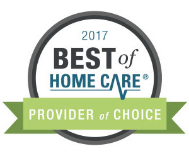Facing the difficult decision of how to continue caring for your loved one?

Whether it’s your parents, a relative, or an elderly friend, seeing them lose their ability to remain independent can be painful. Many seniors do not want to leave their familiar surroundings and move into a nursing home or Assisted Living facility. They may also be uncomfortable about letting a stranger into their home. So, finding the right type of professional care is not an easy job. Whether it's due to aging, illness, or other circumstances such as reduced mobility, entrusting the care of someone you care about to an in-home care agency requires careful consideration. With numerous options available, it's essential to choose a home care provider that aligns with your loved one's needs, preferences, and values. In this comprehensive guide, we walk you through the steps of choosing the right home care agency for your loved one's unique situation. Home care agencies play a pivotal role in providing a wide range of services that enable seniors or individuals with a variety of challenges to remain in the comfort of their own homes while receiving necessary assistance. These services can include personal care, companionship, medication reminders, meal preparation, transportation, and more. The goal is to enhance the quality of life for the care recipient by offering support tailored to their specific needs.
Key Factors to Consider When Choosing a Home Care Agency
1. Assess Your Loved One’s Needs: Start by evaluating your loved one's care needs. Do they require assistance with daily activities like bathing, dressing, and meal preparation? Are there specific medical conditions that need consideration? Understanding their needs will help you narrow down agencies that can provide the appropriate level of care.
2. Licensing and Accreditation: Ensure the home care agency is properly licensed, bonded, and insured. Look for accreditations or certifications that demonstrate their commitment to quality care standards. Reputable agencies are often affiliated with industry organizations that uphold ethical practices.
3. Experience and Reputation: Research the agency's history and reputation. How long have they been in business? Do they have positive reviews from clients and their families? Online reviews and recommendations from healthcare professionals can offer valuable insights into the agency's reliability and reputation.
4. Range of Services: Different agencies offer varying levels of care and services. Determine whether the agency provides the specific services your loved one requires, such as personal or companion care, medical care, dementia care, or other specialized therapies.
5. Caregiver Qualifications: Inquire about the agency's hiring and training processes for caregivers. Ask about their qualifications, background checks, and ongoing training programs. A competent and compassionate caregiver is essential for your loved one's well-being.
6. Personalization: Your loved one’s needs are unique, and a reputable agency should be willing to tailor their services to match those needs with an individualized plan of care.
7. Coordination and Communication: Clear communication between caregivers, clients, and family members is crucial. A reliable agency should have established methods for sharing information, addressing concerns, and keeping everyone informed about the care plan's progress.
8. Emergency Response Plan: Inquire about the agency's emergency protocols. Ensure there's a contingency plan in place to handle unexpected situations, such as caregiver absences or medical emergencies.
9. Cultural Sensitivity: If your loved one has specific cultural or religious preferences, it's important to choose an agency that respects and accommodates those beliefs.
10. Cost and Payment Options: Discuss the agency's pricing structure and payment options. If you’re your loved one has purchased Long Term Care Insurance, understand their policy’s requirements for eligibility and what services are covered. Veterans Benefits may also be an option if criteria are met.
11. Availability and Flexibility: Ensure that the agency can accommodate your preferred schedule and provide care when needed. Some agencies offer 24/7 care, while others may have limitations on hours or days of service.

























